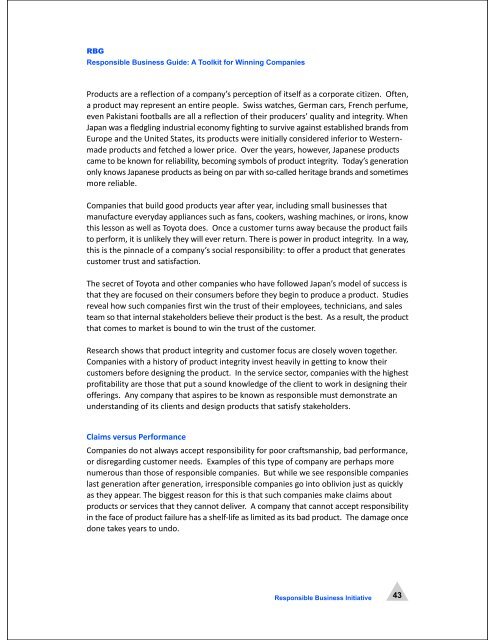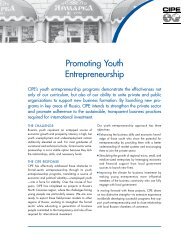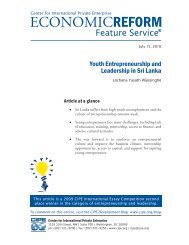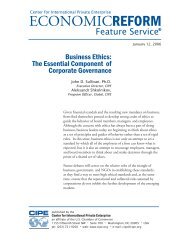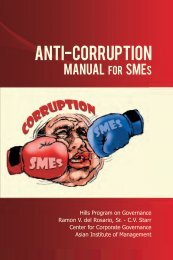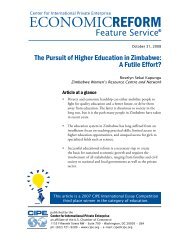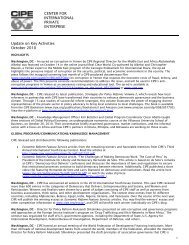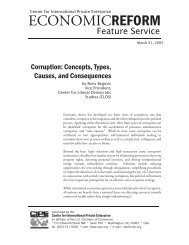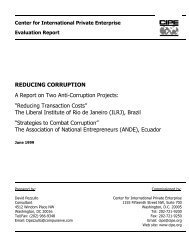Responsible Business Guide: A Toolkit for Winning Companies
Responsible Business Guide: A Toolkit for Winning Companies
Responsible Business Guide: A Toolkit for Winning Companies
You also want an ePaper? Increase the reach of your titles
YUMPU automatically turns print PDFs into web optimized ePapers that Google loves.
RBG<br />
<strong>Responsible</strong> <strong>Business</strong> <strong>Guide</strong>: A <strong>Toolkit</strong> <strong>for</strong> <strong>Winning</strong> <strong>Companies</strong><br />
Products are a reflection of a company’s perception of itself as a corporate citizen. Often,<br />
a product may represent an entire people. Swiss watches, German cars, French perfume,<br />
even Pakistani footballs are all a reflection of their producers’ quality and integrity. When<br />
Japan was a fledgling industrial economy fighting to survive against established brands from<br />
Europe and the United States, its products were initially considered inferior to Westernmade<br />
products and fetched a lower price. Over the years, however, Japanese products<br />
came to be known <strong>for</strong> reliability, becoming symbols of product integrity. Today’s generation<br />
only knows Japanese products as being on par with so-called heritage brands and sometimes<br />
more reliable.<br />
<strong>Companies</strong> that build good products year after year, including small businesses that<br />
manufacture everyday appliances such as fans, cookers, washing machines, or irons, know<br />
this lesson as well as Toyota does. Once a customer turns away because the product fails<br />
to per<strong>for</strong>m, it is unlikely they will ever return. There is power in product integrity. In a way,<br />
this is the pinnacle of a company’s social responsibility: to offer a product that generates<br />
customer trust and satisfaction.<br />
The secret of Toyota and other companies who have followed Japan’s model of success is<br />
that they are focused on their consumers be<strong>for</strong>e they begin to produce a product. Studies<br />
reveal how such companies first win the trust of their employees, technicians, and sales<br />
team so that internal stakeholders believe their product is the best. As a result, the product<br />
that comes to market is bound to win the trust of the customer.<br />
Research shows that product integrity and customer focus are closely woven together.<br />
<strong>Companies</strong> with a history of product integrity invest heavily in getting to know their<br />
customers be<strong>for</strong>e designing the product. In the service sector, companies with the highest<br />
profitability are those that put a sound knowledge of the client to work in designing their<br />
offerings. Any company that aspires to be known as responsible must demonstrate an<br />
understanding of its clients and design products that satisfy stakeholders.<br />
Claims versus Per<strong>for</strong>mance<br />
<strong>Companies</strong> do not always accept responsibility <strong>for</strong> poor craftsmanship, bad per<strong>for</strong>mance,<br />
or disregarding customer needs. Examples of this type of company are perhaps more<br />
numerous than those of responsible companies. But while we see responsible companies<br />
last generation after generation, irresponsible companies go into oblivion just as quickly<br />
as they appear. The biggest reason <strong>for</strong> this is that such companies make claims about<br />
products or services that they cannot deliver. A company that cannot accept responsibility<br />
in the face of product failure has a shelf-life as limited as its bad product. The damage once<br />
done takes years to undo.<br />
<strong>Responsible</strong> <strong>Business</strong> Initiative 43


